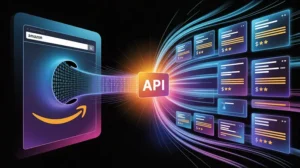Issues with Web Scraping and Online Data Collection
1. What is Web Scraping and Data Collection?
Web scraping refers to the automated process of accessing and downloading content from websites. These programs start from a set of initial web pages and use hyperlinks on these pages to access and download other pages on the website until the entire site is fully downloaded. Data collection involves automatically extracting specific useful information or data from the web pages obtained through scraping. This information may include product prices, financial research, news content, and more.
2. Issues Arising from Web Scraping and Data Collection
Website owners typically want their sites to be crawled by search engines for indexing, thus increasing traffic. However, the speed of web scraping is much faster than human operations, potentially causing severe stress on the servers of the scraped website, leading to slowdowns or crashes. Additionally, businesses may use web scraping to quickly gather data from competitors’ sites, obtaining market information on competitor operations and pricing.
3. Legality of Data Collection
In Singapore, while there are no specific laws governing web scraping and data collection, violations of website terms of use and copyright laws may result in legal consequences. In China, the Personal Information Protection Law regulates the lawful conditions for collecting personal information, with violations leading to fines and legal liability. In the United States, although there is no explicit national regulation, some states may have privacy laws that impose restrictions.
Regulatory Compliance and Risk Management in Data Collection
1. Measures to Minimize Legal Risks
Before engaging in web scraping, carefully read and comply with the terms of use of the website. If scraping is explicitly prohibited in the terms, respect that rule. If there are no specific regulations, it is advisable to contact the website owner for explicit permission. Regarding copyright, limit the content scraped to avoid infringing on original works.
2. Considerations for Avoiding Privacy Violations
In China, respecting personal privacy is crucial. When conducting data collection, explicit consent from users must be obtained, ensuring information is collected within legal, legitimate, and necessary boundaries. Avoid collecting data related to sensitive information such as personal identity, phone numbers, addresses, and bank accounts to comply with personal information protection regulations.
3. Challenges in Web Scraping and Regulatory Compliance
Despite existing regulations, compliance in web scraping and data collection faces challenges. The introduction of new technologies, such as using robots and artificial intelligence for web scraping, makes it difficult for regulations to keep pace with technological developments. Therefore, when engaging in these activities, consulting a technology lawyer familiar with the latest regulations is recommended to ensure compliance.
4. Protecting Your Website from Scraping and Collection
To prevent others from scraping and collecting data from your website, explicitly prohibit the use of scraping and collection bots in the website’s terms of use. Additionally, set up a “robots.txt” file on the website to specify robot access permissions. Implementing CAPTCHA tests is another technical measure to prevent automatic scraping by bots.
Policies on Data Collection in Singapore, China, and the United States
Data Collection Regulations in Singapore
In Singapore, there are no specific regulations regarding the legality of web scraping and data collection. However, these activities may violate existing contract and copyright laws, potentially constituting criminal offenses under computer misuse laws. Violations of website terms of use and copyright infringement can lead to legal liability.
Data Collection Regulations in China
China has explicit regulations regarding data collection. The Personal Information Protection Law in China strictly regulates the collection and processing of personal information. According to this law, the collection of personal information requires clear user consent and must be done within legal, legitimate, and necessary bounds. Violations may result in legal liability and fines.
Data Collection Regulations in the United States
The United States has relatively lax regulations on data collection, with no specific national laws. However, some states may have enacted personal data privacy protection laws. At the federal level, laws such as the Children’s Online Privacy Protection Act (COPPA) address online privacy for children. Overall, the U.S. emphasizes individual freedom and self-regulation by businesses, but compliance with existing laws is still necessary to avoid infringing on personal privacy rights.
Risk Management and Compliance Recommendations: Balancing Ethics, Technology, and Law
Maintaining a balance between ethics, technology, and law is crucial in the data collection process. Here are some recommendations to help minimize potential legal risks and ensure data collection activities remain within ethical and compliant boundaries:
Compliance with Website Terms of Use
Before engaging in any form of web scraping or data collection, thoroughly read the terms of use or agreements of the target website. If the terms explicitly prohibit scraping or collection activities, adhering to these rules is crucial. Violating the terms may result in contractual liabilities, including potential compensation for economic losses.
Respect for Personal Privacy
When conducting data collection, especially when dealing with personal information, strict adherence to privacy protection principles is necessary. In China, where specific regulations exist, obtaining explicit user consent and ensuring legal, legitimate, and necessary data processing is crucial. Avoid collecting data related to sensitive personal information to avoid violations of personal information protection regulations.
Understanding Copyright Regulations
When engaging in web scraping, pay attention to whether the content on the target website is protected by copyright. Attempt to avoid scraping content with creativity and non-automated sorting, as this may constitute copyright infringement. When in doubt, obtaining explicit permission from the website owner is an effective way to reduce copyright law risks.
Fair Use Principles
If data collection involves copyrighted content, the legal concept of “fair use” is generally recognized. Ensure that the collection activities align with fair use principles, considering whether it is for non-profit purposes, the amount of content replicated, and whether there are other reasonable means of obtaining the content.
Controlled Crawling Speed
Reasonably control the crawling speed of web crawlers to avoid placing excessive burden on the target website’s servers. Fast and large-scale scraping may trigger provisions under computer misuse laws, leading to criminal liability and fines.
Using Technical Means to Protect Websites
To prevent others from unauthorized scraping and collection of your website, clearly prohibit the use of scraping and collection bots in the website’s terms of use. Additionally, a “robots.txt” file can be set up on the website to specify robot access permissions. Implementing CAPTCHA tests is another technical measure to effectively prevent automated bots from scraping.
Legal Consultation
Before engaging in data collection activities involving legal risks, it is advisable to seek professional legal advice. Lawyers can help you understand applicable regulations, provide specific compliance recommendations, and offer legal defense in case of legal disputes.
Future Developments and Recommendations for Data Collection
As technology continues to evolve, regulations and ethical guidelines for data collection will continue to evolve. To maintain regulatory compliance, it is recommended to regularly update knowledge of laws and policies related to data collection. Additionally, reinforcing legal awareness and compliance training within the team ensures that all individuals involved in data collection understand and adhere to relevant regulations and ethical guidelines.
In the face of legal uncertainties, communication with a professional lawyer is crucial. Lawyers can provide advice based on the latest legal developments, helping you devise a data collection strategy that is compliant with regulations.
In conclusion, emphasizing respect for the legal rights of others, adherence to regulations, and ethical guidelines is crucial to ensuring the healthy development of the internet ecosystem. While pursuing technological innovation, actively practicing social responsibility contributes to building a more sustainable and just digital society.
Fair Use Principles
Even if scraping involves copyrighted content, the law typically recognizes the “fair use” principle. Ensure that the scraping activities align with fair use principles, considering whether it is for non-profit purposes, the amount of content replicated, and whether there are other reasonable means of obtaining the content.
Computer Misuse Law: Criminal Liability and Fines
In Singapore, the Computer Misuse Act may apply to unauthorized access to computer materials, including using crawlers to access websites. Violations of this law may lead to fines of up to SGD 5,000 or a maximum of two years of imprisonment for a first offense. For a subsequent offense, fines can go up to SGD 10,000 or a maximum of three years of imprisonment. If damage is caused, fines can go up to SGD 50,000 or a maximum of seven years of imprisonment.
Minimizing Criminal Liability under Computer Misuse Law
To minimize criminal liability under the Computer Misuse Act, ensure that the scraping or collection activities align with the website’s terms of use or obtain explicit permission from the website owner beforehand. Additionally, limiting the crawling speed of crawlers to avoid causing excessive burdens on the website can reduce the risk of violating the Computer Misuse Act.
Protecting Your Website from Scraping and Collection Means
To protect your website from unauthorized scraping and collection, explicitly prohibit the use of scraping and collection bots in your website’s terms of use. Additionally, setting up a “robots.txt” file can inform search engines and crawlers about which pages can be accessed. Implementing CAPTCHA tests is another technical means to prevent automated bots from scraping.
Role of Lawyers: Regulatory Compliance and Case Defense
Given the rapid development of regulations in the field of new technologies, consulting technology lawyers is crucial. If you plan to use crawlers and collection bots for business purposes, lawyers can provide best practices for regulatory compliance to minimize potential legal liabilities. If you are a website owner, lawyers can provide legal advice on how to formulate compliant terms of use and address unauthorized scraping and collection.
Conclusion and Recommendations
Data collection is a field fraught with legal challenges, and compliance is paramount. When engaging in data collection, it is essential to comply with regulations in various countries, respect personal privacy, and take measures to protect your website from illegal scraping and collection. Consulting a professional lawyer allows for a better understanding of regulatory changes and best practices, ensuring compliance with the law while navigating the intersection of technology and legal requirements.
Pangolin Scrape API: An Advanced Tool for Compliant Data Collection
As data collection technology continues to evolve, the Pangolin Scrape API emerges as a powerful tool designed to assist researchers, tech startups, and businesses in efficiently and compliantly collecting valuable data from target websites. Let’s delve into the features of Pangolin Scrape API and its commitment to compliance.
Introduction to Pangolin Scrape API
Pangolin Scrape API is a robust data collection tool designed to help users extract valuable information from target websites while maintaining compliance and ethical standards. Here are some key features of the product:
- Intelligent Scraping Engine: Equipped with an intelligent scraping engine, Pangolin Scrape API efficiently extracts the required data from target websites. The engine is highly customizable, allowing users to tailor data extraction based on their specific needs.
- Speed and Efficiency: Pangolin Scrape API boasts exceptional speed and efficiency compared to traditional web scraping tools. Users can obtain large amounts of data in a short period, enhancing the effectiveness and efficiency of data collection.
- Real-time Data Sync: The API supports real-time data synchronization, ensuring users always access the latest information. This feature is crucial for businesses and research institutions interested in real-time market trends.
- User-Friendly Interface: The product features a user-friendly interface that enables easy configuration and management of data collection tasks. Even users without professional programming experience can set up highly complex data collection tasks through simple settings.
Pangolin Scrape API’s Compliance Measures
Pangolin Scrape API is committed to providing compliant data collection solutions, ensuring users adhere to all applicable regulations and ethical guidelines. Here are key measures taken by Pangolin Scrape API to address compliance:
- Compliance with Terms of Use: Pangolin Scrape API requires users to agree to and comply with the terms of use or agreements of the target website before using the product. This step ensures that users respect the regulations set by the target website, mitigating potential legal liabilities.
- Privacy Protection: Pangolin Scrape API is designed with privacy protection principles in mind. In tasks involving personal information, users must follow relevant privacy regulations, ensuring lawful, legitimate, and necessary data processing.
- Regular Updates on Regulations and Policies: Recognizing that regulations and policies may change, Pangolin Scrape API commits to regularly updating its system to align with the latest regulatory requirements. This helps users stay compliant and avoid potential risks arising from regulatory changes.
- Legal Awareness Training: The Pangolin Scrape API team emphasizes the importance of legal awareness and provides training for users on regulations and compliance. This helps users gain a better understanding of legal requirements during the data collection process and enables them to take appropriate compliance measures.
Through these compliance measures, Pangolin Scrape API aims to be a trusted data collection tool, providing users with an efficient, reliable, and compliant data collection experience.
Risk Management and Recommendations: Best Practices for Using Pangolin Scrape API
While Pangolin Scrape API offers powerful data collection features and compliance measures, users should still adopt best practices to minimize potential legal risks. Here are some recommendations for using Pangolin Scrape API:
- Thoroughly Understand the Target Website’s Terms of Use: Before using Pangolin Scrape API, thoroughly understand and comply with the terms of use or agreements of the target website. Ensure that your data collection tasks align with the website’s regulations to avoid legal liabilities.
- Review Privacy Policies and Regulations: For tasks involving personal information, review the target website’s privacy policies and relevant regulations. Ensure that your data collection activities comply with privacy protection laws and obtain necessary user consent.
- Use Data Reasonably: Adhere to the “reasonable use” principle. Ensure that the data collected is used for lawful and non-profit purposes, and replicate only a reasonable amount of content. This helps reduce potential legal risks related to copyright laws.
- Maintain Communication with Legal Professionals: In the face of legal uncertainties or complex situations, maintain timely communication with legal professionals. Lawyers can provide specific legal advice to help you make informed decisions regarding regulations and compliance.
By following these recommendations, users can leverage Pangolin Scrape API for data collection, maximizing its benefits while ensuring compliance. At the intersection of technology and law, practicing reasonable and compliant behavior allows us to collectively drive the healthy development of the data collection field.







